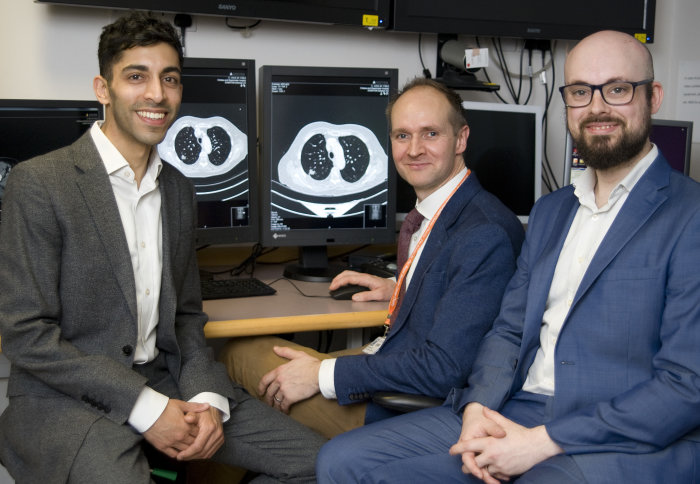AI being developed to help cancer patients during the COVID-19 pandemic

(L-R) Investigators Sumeet Hindocha, Richard Lee and Benjamin Hunter. Credit: The Royal Marsden NHS Foundation Trust
A new study led by The Royal Marsden involving Imperial will use artificial intelligence (AI) to help cancer patients during the COVID-19 pandemic.
The researchers aim to use AI tools to analyse scans from cancer patients. The analyses will help clinicians to prioritise either targeting treatment for the infection or targeting cancer treatment side-effects.
In this study, we aim to use AI to identify to what extent changes seen on chest scans are due to coronavirus or the side effects of cancer treatment. Dr Sumeet Hindocha Department of Computing
People with cancer are at increased risk of developing COVID-19 and are more vulnerable to serious disease due to their weakened immune systems. People with lung cancer – one of the commonest cancers worldwide – are particularly vulnerable as the virus severely impacts the respiratory system.
Some cancers are treated by immunotherapy and radiotherapy. However, these treatments’ side effects like cough, breathlessness, and changes in CT scans can often be very similar to those seen in COVID-19 infection.
Now, a new study, led by The Royal Marsden NHS Foundation Trust in collaboration with The Institute for Cancer Research (ICR) and Imperial College London, hopes to address this issue.
Co-researcher Dr Sumeet Hindocha, of Imperial’s Department of Computing and AI for Healthcare Centre for Doctoral Training, will use clinical and imaging data with machine learning techniques to help distinguish between coronavirus-related lung changes and those caused by immunotherapy and radiotherapy.
Distinguishing between the two will help inform treatment options for patients: for example, cancer therapy-related lung inflammation is often treated with steroids and stronger immunosuppression, which are not suitable for use in COVID-19 patients.
Dr Hindocha said: “Lung inflammation can be a side effect of immunotherapy or chest radiotherapy but can also be a result of COVID-19. It’s important for clinicians to know what the cause is so that they can provide patients with the most appropriate treatment and improve outcomes. In this study, we aim to use AI to identify to what extent changes seen on chest scans are due to coronavirus or the side effects of cancer treatment.”
The team also hope to use AI to diagnose the subtle changes seen in lung cancer recurrence earlier so that it might be treated more effectively.
A lot of the work we do is using AI on CT scan images to identify subtle changes in patients, which might help us to understand why one group of patients behave in a certain way. Dr Richard Lee The Royal Marsden/National Heart and Lung Institute
Lead investigator Dr Richard Lee from The Royal Marsden and Imperial’s National Heart and Lung Institute said: “A lot of the work we do is using AI on CT scan images to identify subtle changes in patients, which might help us to understand why one group of patients behave in a certain way.
“Unlike a traditional trial, we’ll be using CT scan images that already exist of cancer patients who have and haven’t tested positive for COVID-19. The advantage to having the data ready to use is that we should be able to fast-track our research, enabling us to gather results quickly and effectively, which will directly benefit cancer patients and improve their quality of life at this challenging time.”
Professor David Cunningham, Director of The Royal Marsden and ICR NIHR Biomedical Research Centre said: “We are uniquely placed to look at COVID-19 in a cancer setting, investigating the pandemic’s impact across a wide range of patients. These trials call upon our multidisciplinary expertise in areas such as systemic therapies, radiotherapy, surgery and holistic care.
The study is funded by The Royal Marsden Cancer Charity and the ICR NIHR Biomedical Research Centre.
This story was adapted from a press release by The Royal Marsden NHS Foundation Trust.
Image credit: The Royal Marsden NHS Foundation Trust
Imperial COVID-19 Response Fund
Hundreds of supporters are backing Imperial academics and students as they race to understand coronavirus, develop new vaccines, create new diagnostic tests and serve on the NHS frontline. Find out more and donate to the COVID-19 Response Fund.
Article supporters
Article text (excluding photos or graphics) © Imperial College London.
Photos and graphics subject to third party copyright used with permission or © Imperial College London.
Reporter
Caroline Brogan
Communications Division